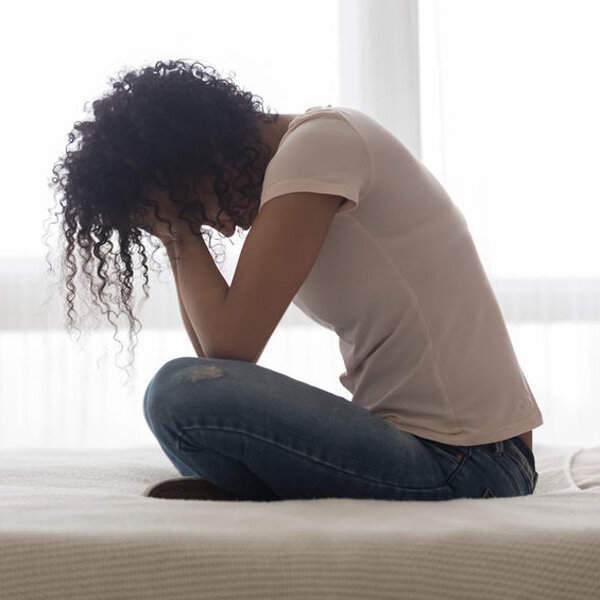The COVID-19 Pandemic and LGBTQ+ Mental Health
An Interview with Casey Slager, LLPC
The month of May is Mental Health Awareness Month. Anxiety and concerns about COVID-19 remain high a year into the pandemic, and mental health effects of the health crisis are on the rise, according to a new American Psychiatric Association survey. Many in our community have been experiencing stress or anxiety this year so we asked professional counselor Casey Slager to share her thoughts on the topic.
OFK: The longer the pandemic goes on, the more we hear about the disproportionate impact that the pandemic and the recession are having on individuals in the LGBTQ+ community. Other than the obvious economic impact, what impact do you believe the crisis has had on LGBTQ+ mental health?
CS: One thing I will say right off is that we actually can’t talk about this question without talking about the economic impact, because it is a part of the domino effect on mental health and wellbeing. We are seeing that the LGBTQ+ community has faced more job loss than the general population, and when you lose your job, you lose your health care, and you lose your ability to afford basic needs for living. For LGBTQ+ adults and youth who have experienced homelessness during the pandemic, access to safe shelter has been restricted. Not only does this have the potential to increase exposure to the virus, but there are significant mental health tolls associated with lack of access to basic needs.
LGBTQ+ youth have been particularly affected by the crisis. When schools had to close and learning shifted to an online environment, this created many concerning situations. For youth who do not live in affirming households, the time spent in an environment that is not conducive to their mental health has more than doubled. Even if LGBTQ+ kids and teens do come from accepting families, suddenly losing regular contact with supportive friend groups and healthy extracurricular outlets has resulted in a rise in reports of anxiety and isolation.
When talking about the fact that people who identify with the LGBTQ+ community are disproportionately affected by the pandemic, you must also consider how intersecting identities contribute to an even greater disparity in regard to access to resources and impacts on mental health. For LGBTQ+ people who are also a part of BIPOC or Asian communities, for example, you just can’t separate out the mental toll of the COVID-19 pandemic from the mental toll of the racist actions and infrastructure of this country. This is something we have seen from the start of the pandemic; for example, people who are living in marginalized communities have been impacted more severely by the virus itself as a direct result of the longstanding and deeply entrenched barriers to mental and physical health care. The civil rights activist Kimberlé Crenshaw has written extensively on this topic.
To add insult to injury, community healing has long been a part of improving and maintaining mental health for the LGBTQ+ community. The pandemic limited access to safe, welcoming communities. It reduced our ability to gather and share experiences, to be heard and seen, to tell our stories in healing spaces.
OFK: Some are now saying that COVID will migrate from a pandemic to an endemic situation where we have to deal with this long-term. The idea that this could go on is enough to cause stress and anxiety. How do you recommend individuals deal with that kind of possibility?
CS: First, balance your news intake. Continue to stay up to date with the latest in scientific research and guidelines for staying safe, but once you’ve got that information, step away. Gathering the relevant information is helpful; inundating yourself with every piece of news, anecdote, or speculation is going to contribute to anxiety. It’s tricky, though, because ingesting all of this information provides us with a sense of control. In reality, it will only serve to keep us stuck in our anxiety. Instead, consider other elements of your life you have control over, such as: how you spend your time (and who you spend it with); how you treat yourself and others; and how you take care of yourself.
Second, acknowledge your feelings. We have been operating from this pandemic-mindset for over a year now. In some ways we have become habituated to the increase in emotional distress this has caused, and in other ways it can continue to surprise us. We also live in a culture that tends to say, “you can be upset about this today, but tomorrow you have to get yourself together.” It is vital to give yourself permission to continue feeling whatever emotions come up for you, whether it is a fresh wave of grief, or anxiety surrounding going back to work, or anger at the state of the world-- whatever you’re feeling is valid.
Anxiety in particular is becoming increasingly common and may present in ways that we wouldn’t initially recognize as anxiety. For example, have you noticed that it takes more effort to leave your home lately? Have you found that you hold more tension in your body these days? Do you have a shorter fuse than normal? Have you found yourself needing more reassurance than ever? Have your sleeping habits changed? How about your ability to concentrate?
There are many ways our bodies and minds display anxiety. The best advice I can give is to pay close attention to your own unique experiences. Notice, notice, notice. When you are able to note that your thoughts are running a mile a minute, or your shoulders are aching from the tension you’re holding-- that’s when you have the ability to do something about it. Coping skills are great, but they do nothing for us if we forget when to use them.
With regard to coping skills, I would say keep it simple and try several on for size. What works in one situation might not work for another, so having a few to fall back on is key. If you do a quick internet search for coping skills, you’ll find hundreds. My favorites are progressive muscle relaxation, paced breathing, and going for a walk.
OFK: Would you say that the pandemic has improved access or created barriers to mental health services for the LGBTQ+ community?
CS: The pandemic has improved access and created barriers to mental health services for the LGBTQ+ community. In some ways, it has opened up more resources than ever before. The world of online mental health care has grown exponentially. For example, telehealth is now a common resource, and there has been an abundance of free and low-cost trainings offered online to practitioners to help them meet the new needs brought on by the pandemic. There have been numerous opportunities to gather in a community setting with people from all over the world through video. It has honestly been amazing to see how the mental health community and adjacent support systems have sprung into action around this.
However, if you don’t have regular access to the internet, or you don’t have the privacy to engage in these services authentically, this whole world has just come into existence in a big meaningful way—and has left you behind. There have been many people who have had to stop their counseling services because their providers were not able to accommodate in-person appointments. An abrupt end to counseling services can be a traumatic experience in the best of times, but in the midst of a global pandemic it can have devastating outcomes.
OFK: There's clearly an emotional component in the decision of whether or not to be vaccinated. How would you counsel an individual who is conflicted about the COVID-19 vaccine?
CS: Deciding whether or not to get a vaccine is a big decision![1] I’ve worked with so many people going through this decision-making process lately. There are many layers to this question, including: the current political climate; the pressing nature of the pandemic itself; historical experiences with the medical community; personal health considerations; fear of the unknown; and the list goes on.
In counseling someone who is conflicted about their personal choice of whether or not to get the COIVID-19 vaccination, I would suggest that they make a list of all the various considerations (positive, negative, and neutral) they have about the vaccine, and note which elements have more weight than others. Seeing it written down takes it from the abstract to the tangible, which can help in the decision-making process.
Then, I’d say gather information! Both from reputable, scientific resources, as well as from trusted people to see what their personal experiences were. It is important to approach the logical and the emotional sides of this decision with equal respect. After you’ve done all of that, it is time to sit with the information. Spend some time reflecting, and some time focusing on other things entirely, letting your brain mull over the information in the background.
Once you’ve landed on a decision, say it out loud, and note how your body reacts. Did you tense? Did you feel a sense of relief? Our bodies give us so much great information about how we feel about something. Be kind to yourself, and if you need to spend further time gathering information and reflecting, do so.
I will offer one caveat to this process: watch out for anxiety. Some anxiety around whether or not to get vaccinated is expected, but if you find yourself continually cycling about this decision to the point of causing you distress or interfering with your ability to engage with your daily activities, it is time to take a step back. As with any other aspect of anxiety and emotional distress caused by the pandemic (or anything else), seeking mental health support is highly recommended.
[1] The CDC recommends you get vaccinated for COVID-19 as soon as you are eligible. COVID-19 vaccination will be an important tool to help stop the pandemic.


